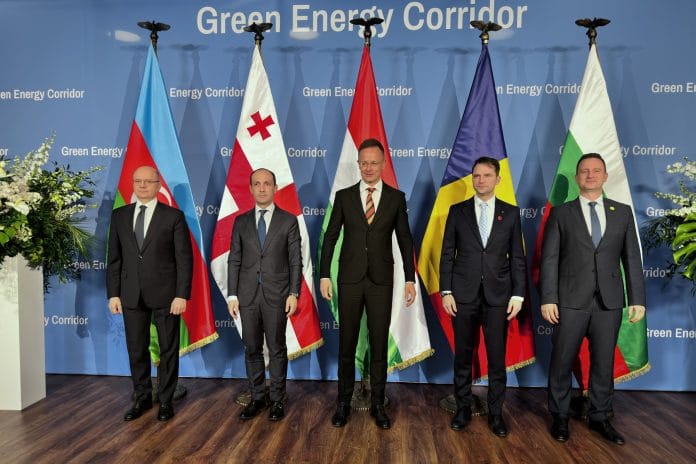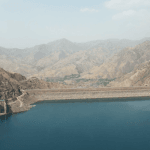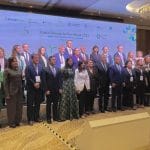The Ministers of Azerbaijan, Georgia, Hungary and Romania met in Budapest on March 10, where they signed a joint letter to EU Energy Commissioner Dan Jorgensen, asking the EU to provide appropriate support for granting the Caspian-Black Sea Green Energy Corridor project with Project of Mutual Interest (PMI) status.
At the 10th Ministerial Meeting/Steering Committee for the implementation of the Agreement on Strategic Partnership in the field of development and transfer of green energy between Azerbaijan, Georgia, Hungary and Romania, the ministers agreed that in order to include the project in the EU’s Ten-Year Network Development Plan (TYNDP), the corresponding request will be submitted by the transmission system operator Transelectrica in the period from April 1 to May 9, and the overall control of the process will be carried out jointly with the Joint Venture GECO Power Company – Green Energy Corridor Power Company, Azerbaijan’s Energy Ministry said, noting that the country was represented by Energy Minister Parviz Shahbazov at the meeting.
Hungary’s Minister of Foreign Affairs and Trade Péter Szijjártó, Georgia’s First Deputy Prime Minister, Minister of Economy and Sustainable Development Levan Davitashvili, Romania’s Energy Minister Sebastian-Ioan Burduja, and Bulgaria’s Energy Minister Zhecho Stankov also represented their countries at the event which was also attended by representatives of the European Commission, the GECO Power Company Joint Venture and Italian consulting firm CESI.
The four countries also agreed to start the procedure for Bulgaria’s accession to the Intergovernmental Agreement. The joint venture was also given the appropriate authority to add Bulgaria to the project and to consider issues related to the fiber-optic cable (FOC) component in the scope of the feasibility study. During the meeting, a corresponding document was signed with the aim of transferring the main powers and obligations under the contract between the Ministry of Energy and CESI to GECO. It was decided to hold the next Ministerial Meeting in Georgia.
“The Caspian-Black Sea Green Energy Corridor is an extremely ambitious initiative,” Tatiana Mitrova, a research fellow at Columbia University’s Center on Global Energy Policy, told NE Global on March 14, adding that the project’s initial timeline envisions commissioning by 2029 – just four years away, yet today it remains without a Final Investment Decision (FID).
Big funding gap holds up Caspian-Black Sea Green Energy Corridor
According to Mitrova, several critical concerns need to be addressed. “The project’s estimated cost is €3.8 billion, with the European Commission committing €2.3 billion to fund the subsea interconnector. This leaves a substantial financial gap, making the overall business model and funding structure unclear. It is difficult to see who will cover the remainder,” she said, explaining that Georgia, for instance, is unlikely to contribute significantly to financing.
Azerbaijan’s renewable energy development poses another major challenge Mitrova argued, noting that in 2024, the country generated 540 million kWh from solar and 48.6 million kWh from wind – a notable increase but far from the steady 1 GW of supply required for the cable in just four years. While Azerbaijan has attracted foreign investment from UAE’s Masdar and Saudi ACWA Power to develop over 10 GW of renewable capacity (contracts and MOUs), the timeline for these projects remains uncertain, and scaling up at this speed presents considerable risks, the expert from Columbia University said.
“Geopolitical complexities add another layer of uncertainty. Concerns about potential Russian influence over the corridor could shape Europe’s perception of whether the project truly enhances energy security,” she explained.
In short, Mitrova concluded, while the Caspian-Black Sea Green Energy Corridor holds promise, its success depends on securing full financing and investment returns, rapidly expanding Azerbaijan’s renewable capacity, and managing geopolitical risks – all within an increasingly tight timeframe.
Francesco Sassi, research fellow in energy geopolitics and markets at R.I.E.-Ricerche Industriali ed Energetiche in Bologna, Italy, told NE Global on March 14 that developing both sides of this new electricity interdependence will be crucial to bring the project from maps into reality. “The financing and political support must come together to ensure that investments will not be wasted by producers of green electricity in the South Caucasus and, on the other hand, by customers in East Europe. This project’s realization comes with major efforts by all these parties and could not simply lean on the hopes of producing green energy in the Caspian Sea,” Sassi noted.

According to Azerbaijan’s Energy Ministry, Shahbazov said that work is underway on relevant contract documents with a number of international wind energy companies on four sites identified in the Azerbaijani segment of the Caspian Sea, and these agreements will also contribute to our plans for the development of green hydrogen. The Azeri Energy Minister presented recommendations on the production and transportation components of the project, as well as business models and research on the distribution of potential volumes of green energy of the Caspian Sea in the region. It was proposed to create two streams in the Working Group in close coordination with GECO and CESI. “The first stream can focus on the business models of the project and carry out preparatory work to establish contacts with potential investors and buyers, and the second – to consider the technical details and compliance with the requirements of ENTSO-E and other relevant organizations,” Shahbazov said, stressing the importance of taking decisive steps to include the fiber-optic component of the project in the scope of the feasibility study.
In Bucharest, during Energy Week Black Sea 2025 on April 2-4, the Energy Transition Conference will delve into policy frameworks, grid modernisation, and emerging technologies driving the region’s clean energy agenda.







